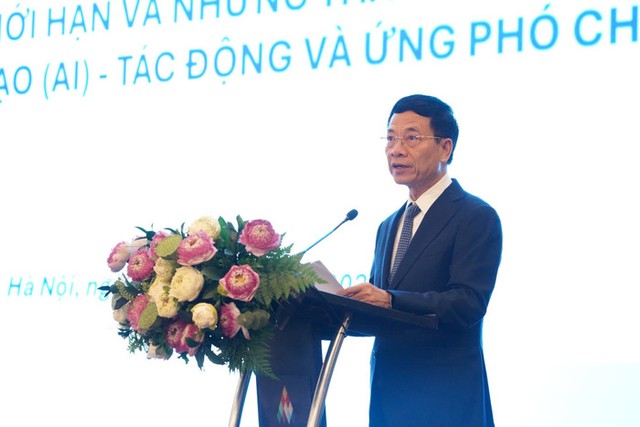Viet Nam to enact AI law in 2025
VGP - Viet Nam will promptly update the 2021 National AI Strategy and issue AI Law by the end of this year to create a comprehensive legal framework for AI. said Minister of Science and Technology Nguyen Manh Hung.

Minister of Science and Technology Nguyen Manh Hung
Minister Nguyen made the above statement at the national scientific conference themed "The Unlimited Power and Unpredictable Challenges of AI – Impacts and Policy Responses" held on Monday by the Ho Chi Minh National Academy of Politics, in coordination with the Ministry of Public Security, the Ministry of National Defense, the Central Theoretical Council, and the Ministry of Science and Technology.
The AI law, said the minister, is not only a legal framework but also a declaration of the national vision: AI must become the country's intellectual infrastructure, serving the people, promoting sustainable development, and enhancing national competitiveness.
In addition, Viet Nam will promptly establish a national AI supercomputing center and a shared open AI data platform, implementing AI-ization much like electrification in the past as fast as possible. AI literacy will be universalized, similar to the English-learning movement in earlier years. In the future, every Vietnamese will have a digital assistant; while the population may not increase, social intelligence is expected to at least double.
On open AI technology, Minister Nguyen stated that Viet Nam is committed to developing and mastering digital technologies, including AI, based on open standards and open-source software. This is also Viet Nam's strategy to develop and master its own technologies under the "Make in Viet Nam" initiative.
Regarding the domestic AI market, Viet Nam will focus on promoting AI applications at enterprises, government agencies, and key sectors. This is considered the fastest way to develop AI and foster the growth of Vietnamese AI companies.
The Government plans to increase spending on AI, with the National Technology Innovation Fund under the Ministry of Science and Technology allocating at least 40 percent of its resources to support AI adoption, including issuing vouchers for small and medium-sized enterprises to use Vietnamese AI solutions.
In terms of policy and institutions, Viet Nam will develop a national AI Ethics Code aligned with international standards but tailored to the country's context, along with an AI Law and an updated AI Strategy based on core principles. These include risk-based management, transparency and accountability, putting people at the center, encouraging domestic AI development, ensuring AI autonomy, leveraging AI as a driver for rapid and sustainable growth, and safeguarding digital sovereignty — built on three strategic pillars: data, infrastructure, and AI technology.
AI development must rest on four critical pillars: AI institutions, AI infrastructure, AI human resources, and AI culture. That means transparent AI institutions, modern AI infrastructure, high-quality AI talent, and a humanistic AI culture./.

